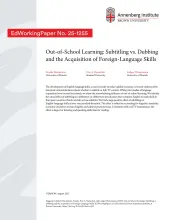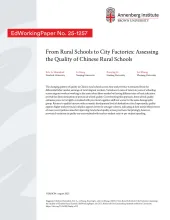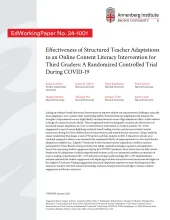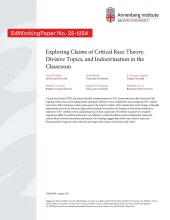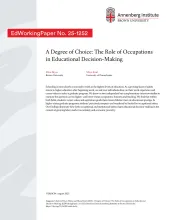Follow the User Guide to start building your site.
Follow the User Guide to start building your site.
NEW EdWorkingPapers
Out-of-School Learning: Subtitling vs. Dubbing and the Acquisition of Foreign-Language Skills
The development of English-language skills, a near necessity in today’s global economy, is heavily influenced by historical national decisions about whether to subtitle or dub TV content. While prior studies of language acquisition have focused on schools, we show the overwhelming influence of out-of-school learning. We identify the causal effect of subtitling in a difference-in-differences… more →
From Rural Schools to City Factories: Assessing the Quality of Chinese Rural Schools
The changing pattern of quality in China’s rural schools across time and province is extracted from the differential labor market earnings of rural migrant workers. Variations in rates of return to years of schooling across migrant workers working in the same urban labor market but having different sites of basic education provide for direct estimation of provincial school quality.… more →
Asset-Based Implementation of Structured Adaptations in an Online Third-Grade Content Literacy Intervention
Scaling up evidence-based educational interventions presents challenges, particularly in adapting to new contexts while maintaining fidelity. Structured adaptations that integrate the strengths of experimental science (high fidelity) and improvement science (high adaptation) represent a novel design framework for supporting the equitable implementation of research-based practices and programs… more →
Leveraging IEPs to Understand Special Education Services at Scale
7.5 million (15%) U.S. public school students have Individualized Education Programs (IEPs) that guide $14 billion in special education services. However, the content of IEPs remains unexplored, primarily because they have been historically inaccessible to researchers at scale. In this study, we develop a coding taxonomy to categorize IEP services from digital IEP records for an entire state.… more →
Exploring Claims of Critical Race Theory, Divisive Topics, and Indoctrination in the Classroom
Critical race theory (CRT) and claims of political indoctrination in K-12 classrooms are at the forefront of the ongoing culture wars surrounding public education. Despite a wave of legislative action targeting CRT-related instruction, little systematic evidence documents the extent to which critics’ claims have merit. Using a nationally representative survey of American high school students,… more →
A Degree of Choice: The Role of Occupations in Educational Decision-Making
Schooling is most closely connected to work at the highest levels of education. As a growing share of adults return to higher education after beginning work, we ask how individuals draw on their work experience and career values to select a graduate program. We draw on two independent but complementary interview studies to examine this question across higher- and lower-status occupations:… more →
